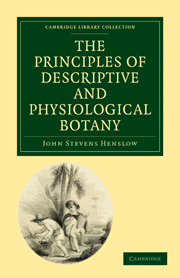Summary
(1.) Of the advantages which accrue from the cultivation of the natural sciences, sufficient has been said in the treatise of Sir J. Herschel, forming our fourteenth volume; and Mr. Swainson, in his discourse, which forms our fifty-ninth volume, has further exposed the importance of the study of Natural History in general, and more particularly of that department which he so successfully cultivates. In introducing the science of Botany to the general reader, for whom more especially this volume is designed, rather than for the scientific adept, it will be right that we should follow the example which has thus been set us, and say a few words by way of introduction to our present subject. Whenever we are about to enter upon any science which is new to us, it is always advantageous to take a general survey of the limits within which it is restricted, and to obtain some notions of the objects of which it professes to treat. We shall, therefore, offer a few remarks upon the position which Botany holds with respect to other kindred branches of Natural History; and point out the separate and subordinate departments into which it may be advantageously divided.
(2.) Botany. — In the most extended sense of the term, Botany may be considered as embracing every inquiry which can be made into the various phenomena connected with one of the three great departments into which the study of nature is divided, and which is familiarly styled the Vegetable Kingdom.
- Type
- Chapter
- Information
- Publisher: Cambridge University PressPrint publication year: 2009First published in: 1835

